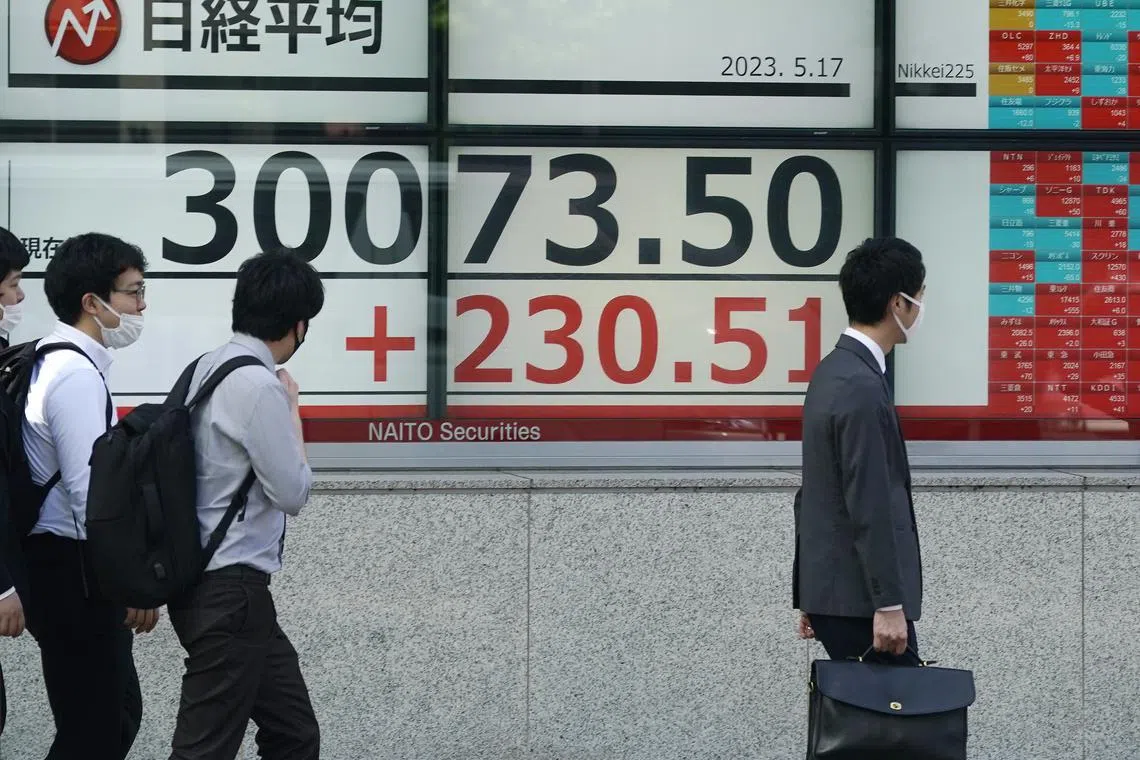Singapore stocks, Asia shares rise on US debt ceiling deal
Sign up now: Get ST's newsletters delivered to your inbox

Japan’s Nikkei surged 1.3 per cent on news that a deal to suspend the US government’s debt ceiling had been reached.
PHOTO: EPA-EFE
Follow topic:
SYDNEY – Asian shares and United States stock futures advanced on Monday, thanks to a weekend deal by US President Joe Biden and congressional Republican Kevin McCarthy
After weeks of negotiations, Mr McCarthy and Mr Biden forged an agreement late on Saturday to avert an economically destabilising default to suspend the US$31.4 trillion (S$42.5 trillion) debt ceiling
Japan’s Nikkei surged 1.3 per cent on the news to a fresh 33-year high, paring a 2 per cent jump, while Australia’s S&P/ASX 200 gained 1.1 per cent. South Korea’s markets were closed for a public holiday.
Singapore’s Straits Times Index was up 0.2 per cent at 11.10am local time, after opening at 0.5 per cent higher.
The positive news also lifted S&P 500 futures by 0.2 per cent in Asia, while Nasdaq futures firmed by 0.4 per cent.
Moving in the opposite direction, China’s blue chips eased 0.1 per cent, while Hong Kong’s Hang Seng index slipped 0.3 per cent, weighed down by profit data for China’s industrial firms on Saturday that reinforced growing signs of loss of momentum in the world’s second-biggest economy.
“There may be an initial sliver of relief that may send yields a tad lower along with some US dollar bump-up, alongside equities. But the vagaries of pushing the deal through Congress may hold back (the optimism),” said Mr Vishnu Varathan, head of economics and strategy at Mizuho Bank in Singapore.
“And beyond that, the overriding implications on liquidity squeeze from issuances to bolster cash that is running very low at the Treasury may perversely elevate yields and dampen equities. The dollar, though, may be bid.”
IG market analyst Tony Sycamore said: “We always thought there was going to be a resolution, and now we have got that, so that removes some of the uncertainty for markets. But when we get past that, when the votes get passed and when we come back from Memorial Day, the question becomes ‘what next’.
“Yes, we will get the relief rally in the short term, but then we have to start thinking about the June FOMC (Federal Open Market Committee) meeting, about inflation being stickier than expected, and the money being drained out of the (share) markets.”
On Friday, the US Federal Reserve’s preferred gauge of inflation – the personal consumption expenditures price index – came in stronger than expected, with markets now leaning towards a quarter-point hike from the Fed when policymakers meet next month and seeing rates staying there for the rest of the year.
In the week ahead, more US economic data will be on tap, such as job openings and non-farm payrolls, which could influence the Fed’s thinking for the June decision. Economists polled by Reuters said payrolls likely rose 195,000 in May, slowing from the 253,000 in the prior month.
In Turkey, the lira hovered at 20.04 against the US dollar, just a touch above its record low of 20.06 hit on Friday, after President Recep Tayyip Erdogan secured victory in the country’s presidential election, extending his increasingly authoritarian rule into a third decade.
Elsewhere in the currency markets, the dollar index – a measure of the greenback against its major peers – was a touch lower at 104.17 as risk-sensitive currencies staged a rebound. However, it was still not too far from a two-month high hit on Friday.
The yen slumped to a fresh six-month low of 140.89 per dollar in early trade, while the euro nursed losses around a two-month trough of US$1.0721 and the Australian dollar hovered at US$0.6527, just a touch above a six-month low hit on Friday. REUTERS

